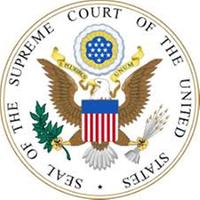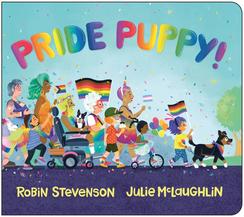 On Friday, the Supreme Court ruled that parents of children in public schools who object to LGBTQ+ picture books may opt out of lessons or instruction involving those books. The case was brought by three sets of parents against the Montgomery County (Md.) Board of Education, objecting on religious grounds to books that are LGBTQ+ inclusive and had been approved as supplemental curriculum for the schools' language arts program. The ruling was roundly denounced by members of the book world.
On Friday, the Supreme Court ruled that parents of children in public schools who object to LGBTQ+ picture books may opt out of lessons or instruction involving those books. The case was brought by three sets of parents against the Montgomery County (Md.) Board of Education, objecting on religious grounds to books that are LGBTQ+ inclusive and had been approved as supplemental curriculum for the schools' language arts program. The ruling was roundly denounced by members of the book world.
The American Booksellers Association issued this response: "American Booksellers for Free Expression is deeply disappointed by the Supreme Court's 6-3 ruling in favor of the plaintiffs in Mahmoud v. Taylor, singling out LGBTQIA2S+ books for special scrutiny to provide parents with 'opt-outs' of their inclusive messaging. The plaintiffs in the case allege that the First Amendment rights of certain parents were violated because the 'normative' messages in the books--that LGBTQIA2S+ identities, marriages, and communities exist and should be respected--violated the religious upbringing of the students. In its defense, Montgomery County Public Schools argued that such opt-outs would be burdensome, counter to its policies of inclusion, and would adversely affect LGBTQIA2S+ students in the district. We agree.
"An 'opt-out' does not just impact the students whose parents choose to exercise it. As Justice Sotomayor notes in her dissent, 'many school districts, and particularly the most resource strapped, cannot afford to engage in costly litigation over opt-out rights... Schools may instead censor their curricula, stripping material that risks generating religious objections. The Court's ruling, in effect, thus hands a subset of parents the right to veto curricular choices long left to locally elected school boards.' This decision subjects LGBTQIA2S+-inclusive books to a special scrutiny based on their ideas, stigmatizing LGBTQIA2S+ children and families while letting the religious views of some parents dictate curriculum for all students.
"Today's ruling impacts educators, parents, and students, but it does not determine what booksellers can do. Indie bookstores can continue to offer third spaces where tolerance and pluralism are uplifted if they so choose. But that does not erase the stigma that will attach to inclusive books as a result of this ruling, and it does not undo the shame some children will experience when their peers have to leave the room because of characters in whom they see themselves reflected. We stand with teachers, parents, students, and educators as they navigate the uncertain waters in the wake of this ruling."
 In addition, ABFE listed the books objected to in the suit "to help any who feel a desire to support the authors in some way in their store":
In addition, ABFE listed the books objected to in the suit "to help any who feel a desire to support the authors in some way in their store":
Pride Puppy! by Robin Stevenson, illus. by Julie McLaughlin (Orca)
Uncle Bobby's Wedding by Sarah S. Brannen, illus. by Lucia Soto (little bee books)
IntersectionAllies: We Make Room for All by Carolyn Choi, LaToya Council, and Chelsea Johnson, illus. by Ashley Seil Smith (Dottir Press)
My Rainbow by DeShanna Neal and Trinity Neal, illus. by Art Twink (Kokila)
Prince & Knight by Daniel Haack, illus. by Stevie Lewis (little bee books)
Love, Violet by Charlotte Sullivan Wild, illus. by Charlene Chua (Farrar, Straus and Giroux Books for Young Readers)
Born Ready: The True Story of a Boy Named Penelope by Jodie Patterson, illus. by Charnelle Pinkney Barlow (Crown Books for Young Readers)
Jacob's Room to Choose by Sarah Hoffman and Ian Hoffman, illus. by Chris Case (Magination Press)
What Are Your Words?: A Book About Pronouns by Katherine Locke, illus. by Anne Passchier (Little, Brown Books for Young Readers)
Penguin Random House, which filed an amicus curiae brief in the case with the Educational Book and Media Association and the Authors Guild, called the ruling "a devastating setback for public education and the right to read. As Justice Sotomayor powerfully wrote in dissent, the decision 'guts our free exercise precedent and strikes at the core premise of public schools.' Allowing individuals to opt-out of reading certain materials erases marginalized voices and forces teachers to manage restrictions that lead to silent censorship. Reading a book does not require agreement--only openness to engaging with different experiences. Penguin Random House stands with the teachers, librarians, and students now facing even greater barriers to building classrooms that reflect the world around them."
Elly Brinkley, staff attorney for U.S. free expression programs at PEN America, said: "This ruling is a deeply disappointing blow to the right to read under the First Amendment. It is a fundamental betrayal of public schools' duty to prepare students to live in a diverse and pluralistic society. By allowing parents to pull their children out of classrooms when they object to particular content, the justices are laying the foundation for a new frontier in the assault on books of all kinds in schools. In practice, opt outs for religious objections will chill what is taught in schools and usher in a more narrow orthodoxy as fear of offending any ideology or sensibility takes hold. Opt outs required under the broad ruling of the court are unworkable and will potentially lead schools to sweep out all kinds of books to avoid the challenge altogether. LGBTQ+-themed books have already been the main casualties among the 16,000 books banned since 2021. This will exacerbate that devastating trend.
"The Court's conservative majority failed to even consider the fundamental free speech principles also at issue here, instead handing down a ruling that could have a broad chilling effect and open the door to censorship and discrimination. This risks significant harm for millions of children who may no longer see themselves or their families reflected in stories read in classrooms, while others will be denied the chance to build understanding and empathy for those different from themselves. The decision will allow any parents to object to any subject, with the potential to sow chaos in schools, and impact students, parents, educators, authors, and publishers. With rising polarization, xenophobia, and the targeting of vulnerable populations, we need schools that open students' minds, not betray education by closing them off from the real world."

